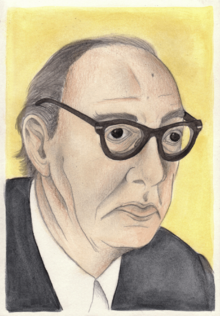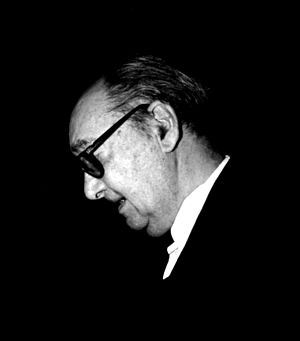Juan Carlos Onetti facts for kids
Quick facts for kids
Juan Carlos Onetti
|
|
|---|---|

Portrait of the writer
|
|
| Born | July 1, 1909 Montevideo, Uruguay |
| Died | May 30, 1994 (aged 84) Madrid, Spain |
| Occupation | Journalist, Novelist |
| Nationality | Uruguayan |
Juan Carlos Onetti Borges (born July 1, 1909 – died May 30, 1994) was a famous writer from Uruguay. He wrote many novels and short stories, becoming one of the most important authors in Latin America.
Contents
Early Life and Family
Juan Carlos Onetti was born in Montevideo, the capital city of Uruguay. His father, Carlos Onetti, worked for the customs office. His mother, Honoria Borges, came from an important family in Brazil.
Juan Carlos had two siblings: an older brother named Raul and a younger sister named Rachel. His family's original name was O'Nety, which might have come from Ireland or Scotland. Onetti himself said that his great-great-grandfather was English and born in Gibraltar. His grandfather later changed the name to sound more Italian.
Starting His Writing Career
Onetti did not finish high school, but he loved to write. His first novel, El pozo (which means The Pit), was published in 1939. His friends and some other writers really liked it, even though only 500 copies were printed at first.
When he was 30, Onetti started working as a secretary for a well-known Uruguayan newspaper called Marcha. He also lived in Buenos Aires, Argentina, for a few years. There, he wrote short stories and movie reviews for local newspapers. He also became friends with Roberto Arlt, another important novelist and journalist.
Becoming a Famous Writer
Onetti became one of the most respected writers in Latin America. In 1962, he won the Uruguay National Literature Prize, which is a big award in his home country.
He was also a key member of a group of Uruguayan writers and thinkers known as the 'Generation of 45'. This group included many talented people like Mario Benedetti and Idea Vilariño.
Challenges and Moving to Spain
In 1974, Onetti and some of his friends faced a difficult time. They were part of a jury for a literary contest held by the Marcha newspaper. They chose a short story called El guardaespaldas (The Bodyguard) as the winner. This story had some sensitive political themes.
Because of some misunderstandings, the story was published in Marcha, even though they had agreed not to. This led to Onetti and his colleagues being arrested by the military government at the time. He was held for six months in a mental institution.
Many famous writers from around the world, including Gabriel García Márquez and Mario Vargas Llosa, wrote letters to the Uruguayan government asking for Onetti's release.
After he was set free, Onetti left Uruguay and moved to Spain with his wife, Dorothea Muhr, who was a violinist. He continued to write in Madrid. In 1980, he received the Premio Cervantes, which is the most important literary prize for Spanish-speaking writers. He lived in Madrid until he passed away in 1994 and is buried there.
Awards for His Writing
Juan Carlos Onetti received several important awards for his literary work:
- Uruguay National Literature Prize (1962)
- William Faulkner Foundation Ibero-American Award (1963)
- Italian-Latin American Institute Prize (1972)
- Premio Cervantes (1980)
Selected Books
Here are some of Juan Carlos Onetti's well-known books:
- El pozo (1939) – The Pit
- Tierra de nadie (1941) – No Man's Land
- La vida breve (1950) – A Brief Life
- Los adioses (1954) – The Goodbyes
- El astillero (1961) – The Shipyard
- Juntacadáveres (1964) – Body Snatcher
- Dejemos hablar al viento (1979) – Let the Wind Speak
- Cuando ya no importe (1993) – Past Caring
Movies Based on His Stories
Some of Onetti's stories have been turned into movies:
- The Uruguayan director Alvaro Brechner made a film in 2009 called Bad day to go fishing (Mal día para pescar). It was based on Onetti's story "Jacob y el Otro." This movie was shown at the 2009 Cannes Film Festival.
- There is also an Argentinian movie based on his short story "El infierno tan temido."
His Legacy
To honor Juan Carlos Onetti, an important literary award in Montevideo is named after him: the Concurso Literario Juan Carlos Onetti. This shows how much his writing is still valued and remembered.
Images for kids
See also
 In Spanish: Juan Carlos Onetti para niños
In Spanish: Juan Carlos Onetti para niños
 | William L. Dawson |
 | W. E. B. Du Bois |
 | Harry Belafonte |



